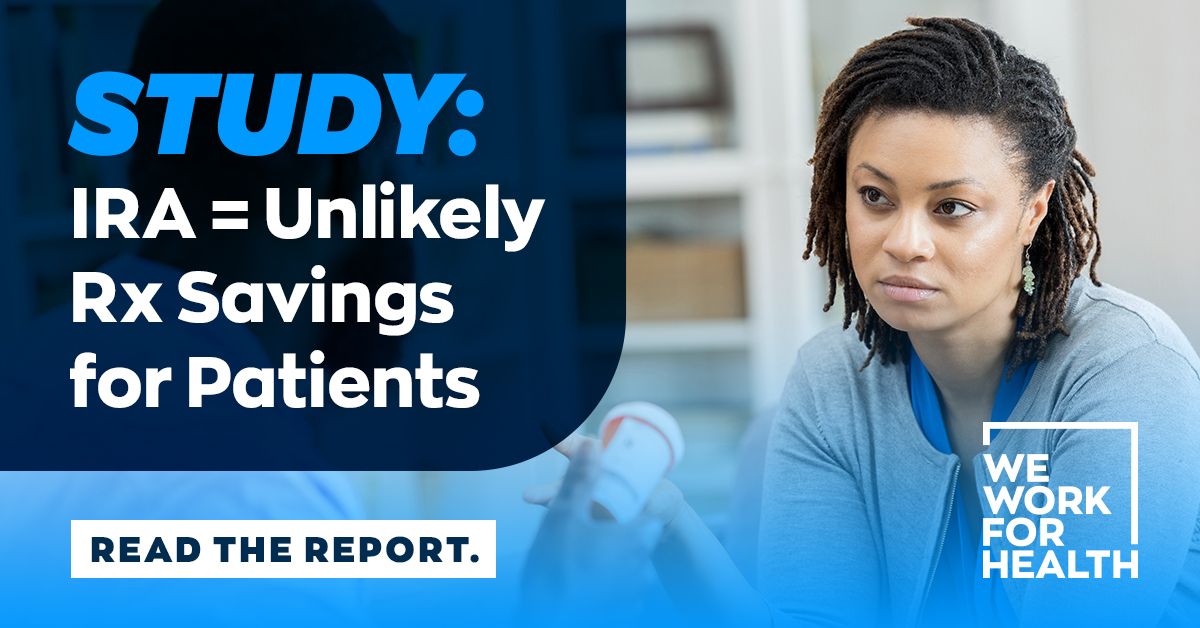New Report Provides Critical Context to Government Claims of IRA So-Called Drug Savings and Explores the Law’s True Impact on Patient Costs
From our partners at We Work for Health

New research from the IQVIA Institute for Human Data Science further confirms what We Work For Health (WWFH) and others have warned against: the Inflation Reduction Act’s (IRA) price controls on prescription drugs will not achieve their stated goal of consistently reducing patient costs. Rather, several unintended consequences reduce choices for patients, raise costs for many, and threaten the development of future therapies.
While significant media coverage and political chatter about the impact of the IRA continues, little actual analysis of the law’s policies in practice from the patient perspective is available – until now. Researchers at the IQVIA Institute examined how much patients actually pay for the first 10 medicines subject to Medicare’s price controls and what, if any, impact IRA’s policies would have on patient costs.
The IQVIA Institute researchers also reviewed what savings Medicare would achieve from these policies in 2026 given the changing drug use dynamics and compared that to government estimates of program savings. The researchers found:
- Government price controls are unlikely to lead to consistent reductions in patient costs, with many patients experiencing negligible savings or even paying more.
- The law is likely to lead to significant changes in the drug coverage Medicare beneficiaries experience, including insurers placing so-called negotiated medicines on higher formulary tiers where patient cost sharing may be higher. Though the price setting does not take effect until 2026, changes in Medicare drug coverage are already causing changes people will experience – including premiums increases in 2026.
- CMS’ claim that the IRA will save Medicare $6 billion based on 2023 spending is likely an inaccurate and misleading overestimate, because it assumes there will be no other changes to the net prices or utilization of the selected drugs and that no new biosimilar or generic options will become available between 2023 and 2026.
One of the IRA’s stated goals was to lower the cost of medicines, and it aimed to do so with three main policy changes: a $35/month insulin cap; a $2,000 annual out-of-pocket cost cap; and price controls on prescription drugs. Yet this approach fails to consider the other factors that go into what a patient ultimately pays at the pharmacy counter and the implications the IRA would have on insurance plan design.
While the cap on out-of-pocket spending will reduce costs for some patients with high drug spending, price controls are unlikely to reduce out-of-pocket costs for most patients. This is because the IRA ignores the reality that what patients pay for medicines is determined by their health plan and is the result of a complicated process heavily influenced by insurance plan design and not by the medicine’s initial list price.
This report illustrates how patients taking any of the 10 drugs chosen for price setting would interact with the insurance and their resulting copay or cost sharing under IRA.
Prior research notes that people who pay a fixed copay for their medicines may pay the same amount for their drugs under the IRA, though the drugs are subject to price controls. Whether their access to those medicines remains the same, however, is questionable. If plans change where these drugs are on their formularies, patient costs may shift to coinsurance, resulting in a significant increase in patient costs for most drugs in this group.
Plans may choose to move these drugs to non-preferred tiers due to the reduction in rebates, which would cause a shift in cost sharing structure. A co-insurance design of 40% would be used, resulting in a substantial rise in patient OOP costs for most drugs in this group.
We Work For Health continues to call on policymakers to recognize the consequences and not double down on the IRA’s many flaws. IQVIA’s findings provide more evidence for lawmakers to understand the negative impact of the IRA’s government-mandated drug pricing provisions and the urgent need to prioritize patient- and innovation-centric pathways forward.
Read the full press release and report.




